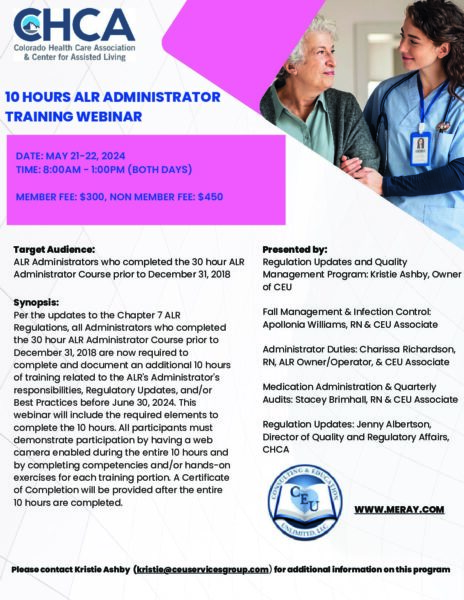State Legislation
2024 Legislative Session Wrap-Up
The 2023-2024 Session of the Colorado General Assembly was concluded on May 8th. The Colorado Health Care Association tracked and worked to influence a great number of bills. As always, our policy direction was guided by the CHCA Board of Directors and the Governmental Policy Committee. Below are the bills with the most direct impact that passed this year, and one significant bill that did not pass. Most of these pieces of legislation will require regulatory rule-making to implement, and CHCA will track the relevant activities and keep the membership apprised.
Most Significant Bills that Passed:
HB 24-1229 Presumptive Eligibility Long-Term Care
This bill allows the Colorado Department of Health Care Policy and Finance to submit a State Plan Amendment to CMS to enact Presumptive Eligibility for people with disabilities that are attempting to access Medicaid benefits.
When enacted, this legislation will provide relief to Medicaid providers in that they will begin receiving reimbursement for a resident whose Medicaid status is pending, until such time as a determination is made that the individual does not qualify. Full enactment will require HCPF application, CMS approval, and approval from the state Medical Services Board.
HB 24-1472 Raise Damage Limit Tort Actions
This bill raises the caps for non economic damages under professional medical liability, general liability, and wrongful death claims in Colorado. Professional medical liability non economic damages will increase to $875,000 and related wrongful death liability will be capped at $1.57 Million over the 5 year timeframe. General liability non economic damages limits will increase to $1.5 Million and related wrongful death to $2.3 Million over the 5 year timeframe.
CHCA worked with a very broad coalition of providers, insurers and business interests on passage of this bill. Coloradoans Protecting Patient Access (CPPA) negotiated the outcome of this bill on behalf of all of these interests. The trail lawyers’ association had received approval to run ballot initiatives that would have removed all liability caps in Colorado. Which would have been disastrous for a variety of reasons. This bill, while still increasing pressure on health care providers, was seen as preferable to losing the caps altogether.
A memorandum from CPPA provides a concise overview of the new liability limits, as well as the timelines for implementation.
SB 24-167 Training for Entry Level Health Care Workers
The bill requires each operator of an assisted living residence to require each direct-care worker to complete direct-care training to provide specific services to residents.
The individual or entity that provides training is required to provide each trained direct-care worker with a certificate of completion of training that may be presented to another assisted living residence to consider for the purposes of satisfying the residence’s training requirements.
For a direct-care worker who has been issued a certificate of completion, an operator of an assisted living residence may require an employee to complete new training or may require the completion of a competency test prior to the employee providing direct-care services.
Most Significant Bill NOT passed:
HB 24-1066 Prevent Workplace Violence in Health Care Settings
The bill would have done the following:
- Establish a workplace violence prevention committee to document and review workplace violence incidents at the facility and develop and regularly review a workplace violence prevention plan (plan) for the facility;
- Adopt, implement, enforce, and update the plan;
- Provide training on the plan and on workplace violence prevention;
- Submit biannual workplace violence incident reports to the department of public health and environment or the behavioral health administration, as applicable; and
- If a workplace violence incident occurs, offer post-incident services to affected staff.
CHCA opposed this bill on the grounds that it was adding a new level of regulatory burden to our provider organizations without new resources. We also testified that we would prefer to see workforce violence measures that included input from long term care providers and senior living providers. While this bill did not pass this session, we expect to see something similar introduced during the next session.
Related Bills that Passed:
HB 24-1002 Social Work Licensure Compact
The bill allows Colorado to enter into a multistate compact for Licensed Social Workers
HB 24-1004 Ex-Offenders Practice in Regulated Occupations
This bill provides avenues for ex-offenders to appeal a decision to deny them a license to work in a regulated occupation. Nothing in this bill changes the hiring decisions or requirements for employers.
HB 24-1417 Fee Changes Health Care Cash Funds
The bill establishes the amounts by which the state board of health in the department of public health and environment (department) may increase the fees payable to the general licensure cash fund, the assisted living residence cash fund, and the home care agency cash fund. The fees are increased up to 8% in state fiscal year 2025-26; 6% in state fiscal years 2026-27, 2027-28, and 2028-29; and, in each fiscal year thereafter, an amount based on the percentage change reflected in the prior year’s consumer price index. The bill requires the state auditor to audit the efficiency of the department’s use of the facility fees.
SB 24-018 Physician Assistant Licensure Compact
This bill allows the State of Colorado to enter into a multistate compact for Licensed Physician Assistants.
SB 24-068 Medical Aid in Dying
Current law authorizes an individual with a terminal illness to request, and the individual’s attending physician to prescribe to the individual, medication to hasten the individual’s death (medical aid-in-dying). The bill modifies the medical aid-in-dying laws by:
- Providing an advanced practice registered nurse with the same authority to evaluate an individual and prescribe medication as a physician;
- Adding language specifying that if any end-of-life options conflict with requirements to receive federal money, the conflicting part is inoperative and the remainder of the law will continue to operate; and
- Reducing the waiting period between oral requests from 15 days to 7 days and allowing attending providers to waive the mandatory waiting period if the patient is unlikely to survive more than 48 hours and meets all other qualifications.
SB 24-205 Consumer Protections for Artificial Intelligence
The bill requires a developer of a high-risk artificial intelligence system to use reasonable care to avoid algorithmic discrimination in the high-risk system. The bill requires the deployer of a high-risk artificial intelligence system to use reasonable care to avoid deploying an artificial intelligence system in a discriminatory way. There is a developer or deployer used reasonable care if the developer complied with specified provisions in the bill, which are extensive.
This bill has not yet been signed by the Governor.
![Colorado Health Care Association [logo]](https://www.cohca.org/wp-content/themes/cohca/images/logo.png)









